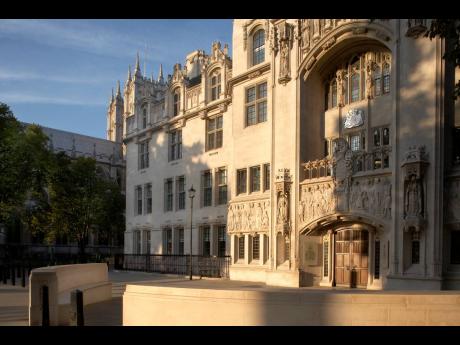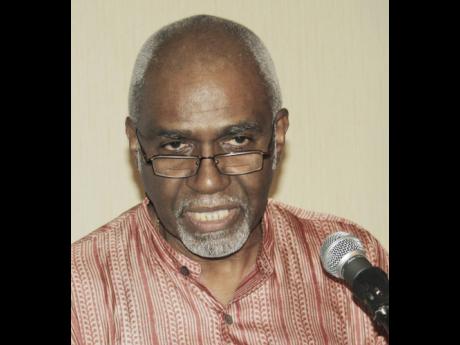Patrick Robinson | The nature of reversals by a higher court
Jamaica has many silly seasons. In the present one a hue and cry has been raised because the UK Privy Council has overturned a decision of Jamaica’s Court of Appeal in respect of appellants charged with murder. Never mind that the same set of judges in the Privy Council, sitting on the UK Supreme Court, established in 2009, regularly reverse decisions of the UK Court of Appeal in a variety of cases, including those relating to murder. And they do so without so much as a murmur of any adverse comment from the people of the UK – and certainly none from their lawyers – on the competence of that country’s Court of Appeal judges.
But what is a quotidian occurrence in the UK is seen as something special and exceptional in Jamaica, and a basis for an everlasting connection with the Privy Council, an anachronistic body, established in the UK in 1833 to hear appeals from “the plantations and colonies”. What is the explanation for the extraordinary and otiose response in Jamaica to the Privy Council’s reversal of the decision of the Court of Appeal in the Vybz Kartel appeal?
MISUNDERSTANDING
There appears to be a complete misunderstanding in Jamaica of the nature of law. May I refer to my letter published by The Gleaner on March 11, 1991, addressing objections to the replacement of the Privy Council by a Caribbean Court of Appeal as Jamaica’s final appellate body; in particular, I focused on the comment, usually made following the Privy Council’s reversal of a decision of the Jamaican Court of Appeal, that our judges are foolish and stupid.
If my memory is correct, I had in mind one such comment by a senior lawyer and counsel for the Queen. In the letter I stated that, “Law is not a mathematical science, such as mathematics or physics. Law is basically an interpretative, persuasive and evaluative discipline. In law there are very few eternal verities and mathematical certainties. In law we are tossed about and buffeted by waves of controlled subjectivities; In law we are not becalmed on still waters; the terrain is not predictably smooth, flat and plateau-like; it is undulating and uncertain”.
It follows that the reversal of a court’s decision by a higher court does not necessarily mean that justice has been better served by the ruling of the Higher Court. Robert Jackson, a Justice of the Supreme Court of the USA between 1941 and 1954, and a prosecutor at the Nuremberg Trial, said as much. In the 1953 Brown v Allen case, he wrote,
“… whenever decisions of one court are reversed by a higher court, a percentage of them are reversed. That reflects a difference of outlook normally found between personnel comprising different courts. However, reversal by a higher court does not prove that justice is thereby better done. There is no doubt that, if there were a super Supreme Court, a substantial proportion of our reversal of state courts would also be reversed. We are not final because we are infallible, but we are infallible because we are final”
This is pretty much what was stated in my letter when I explained that, “The overturning of a decision of a lower court by a higher court does not necessarily mean that the judges of the lower court are stupid or of weak intellect”; “It merely means that three or five persons have been persuaded to take a different approach to a particular issue from the judges in the Court below”.
Why is it that in the United Kingdom people appear to grasp this simple point and therefore do not criticise their Court of Appeal judges when their decisions are reversed by the UK Supreme Court, but we in Jamaica immediately see a reversal by the Privy Council of a decision of our Court of Appeal as reflecting poorly on the quality of the judges of that Court?
The answer is simple: our response is informed and coloured, perhaps more subliminally than consciously, by the impact of transatlantic chattel slavery and colonisation. And so, as I stated in the 1991 letter, the answer is “deeply rooted in the history and psyche of a people whose self-esteem, dignity and independence have been so subverted over the past three centuries as to make them feel that external institutions are superior to their own”.
Jamaica cannot continue to have as its final court a foreign body that does not reflect the identity and culture of Jamaicans. I appeared before the Privy Council on a single occasion representing the Attorney General of Jamaica in 1996 ( Junious Morgan v the Attorney General). The minute I entered the courtroom I realised that I was appearing before a foreign body. I wondered how in heaven’s name did I find myself in this courtroom, thirty-four years after Jamaica’s Independence.
END ANACHRONISTIC RELATIONSHIP
We must end this colonial and anachronistic relationship. The lawyers and judges in Jamaica and the Caribbean are well equipped to serve in a final appellate body. Jamaica must move quickly to accept the appellate jurisdiction of the Caribbean Court of Justice.
Even though reversals are not an appropriate measure of the competence of a lower court, there is evidence that the Jamaican Court of Appeal compares favourably with its English counterpart, the UK Court of Appeal. The comparison is apt because it is the same set of judges of the UK Supreme Court who sit on appeals from the UK Court of Appeal and the Jamaican Court of Appeal.
In my address to the Cornwall Bar Association on December 4, 2010, (published in the Daily Observer on December 6, 2010), I indicated that research showed that “the percentage of appeals allowed by the Privy Council from decisions of the Jamaican Court of Appeal was roughly the same as for appeals allowed by the UK Supreme Court from decisions of the UK Court of Appeal, i.e. between 30 and 40 per cent. Our judges would, therefore, seem to be as good, or as bad, as the UK judges”.
The Privy Council continues to be used very sparingly by Jamaicans. In the period from 2011 to 2021 the Jamaican Court of Appeal averaged about 270 decisions each year, but only 4.5 appeals per year were dispatched to the Privy Council. In fact, in 2018 and 2020 one dege dege appeal was dispatched in each year.
But let us be clear about one matter: the need to replace the Privy Council with the Caribbean Court of Justice does not rest on the number of decisions from the Jamaican Court of Appeal reversed or upheld by the Privy Council, although, as we have seen, the statistics are not unfavourable to Jamaica; more specifically, it does not depend on the reversal by the Privy Council of the Jamaican Court of Appeal’s decision in the Vybz Kartel case; indeed, the need would remain, even if the Privy Council had affirmed the decision of the Jamaican Court of Appeal.
Nor does it depend on the requirement, burdensome though it is, that Jamaicans must have a visa to enter the UK; indeed, the need would remain even if the UK government removed this requirement. Moreover, that need is not rendered superfluous by the Privy Council’s offer of virtual hearings to avoid the high cost of hearings in London; in fact, that need would remain even if the UK were to offer a huge sum of money to appellants to lure appeals to the Privy Council.
Judge Patrick Robinson is a former Jamaican member of the International Court of Justice. Judge Robinson was a member of the ICJ from 2015. Next week the second part delves into The Colonial Spectacle. Send feedback to columns@gleanerjm.com.


